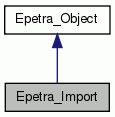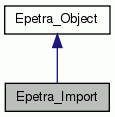|
Epetra
Development
|
Epetra_Import: This class builds an import object for efficient importing of off-processor elements. More...
#include <Epetra_Import.h>


Public Member Functions | |
| Epetra_Import (const Epetra_BlockMap &TargetMap, const Epetra_BlockMap &SourceMap) | |
| Constructs a Epetra_Import object from the source and target maps. More... | |
| Epetra_Import (const Epetra_BlockMap &TargetMap, const Epetra_BlockMap &SourceMap, int NumRemotePIDs, const int *RemotePIDs) | |
| Expert-only import constructor. More... | |
| Epetra_Import (const Epetra_BlockMap &TargetMap, const Epetra_BlockMap &SourceMap, int NumRemotePIDs, const int *RemotePIDs, const int &NumExportIDs, const int *ExportLIDs, const int *ExportPIDs) | |
| Expert-only import constructor. More... | |
| Epetra_Import (const Epetra_Import &Importer) | |
| Epetra_Import copy constructor. | |
| Epetra_Import (const Epetra_Export &Exporter) | |
| Epetra_Import pseudo-copy constructor. Creates an Epetra_Import in the reverse direction of the Epetra_Export argument. | |
| virtual | ~Epetra_Import (void) |
| Epetra_Import destructor. | |
| int | NumSameIDs () const |
| Returns the number of elements that are identical between the source and target maps, up to the first different ID. | |
| int | NumPermuteIDs () const |
| Returns the number of elements that are local to the calling processor, but not part of the first NumSameIDs() elements. | |
| int * | PermuteFromLIDs () const |
| List of elements in the source map that are permuted. | |
| int * | PermuteToLIDs () const |
| List of elements in the target map that are permuted. | |
| int | NumRemoteIDs () const |
| Returns the number of elements that are not on the calling processor. | |
| int * | RemoteLIDs () const |
| List of elements in the target map that are coming from other processors. | |
| int | NumExportIDs () const |
| Returns the number of elements that must be sent by the calling processor to other processors. | |
| int * | ExportLIDs () const |
| List of elements that will be sent to other processors. | |
| int * | ExportPIDs () const |
| List of processors to which elements will be sent, ExportLIDs() [i] will be sent to processor ExportPIDs() [i]. | |
| int | NumSend () const |
| Total number of elements to be sent. | |
| int | NumRecv () const |
| Total number of elements to be received. | |
| const Epetra_BlockMap & | SourceMap () const |
| Returns the SourceMap used to construct this importer. | |
| const Epetra_BlockMap & | TargetMap () const |
| Returns the TargetMap used to construct this importer. | |
| Epetra_Distributor & | Distributor () const |
| const Epetra_Distributor * | DistributorPtr () const |
Print object to an output stream | |
| virtual void | Print (std::ostream &os) const |
 Public Member Functions inherited from Epetra_Object Public Member Functions inherited from Epetra_Object | |
| Epetra_Object (int TracebackModeIn=-1, bool set_label=true) | |
| Epetra_Object Constructor. More... | |
| Epetra_Object (const char *const Label, int TracebackModeIn=-1) | |
| Epetra_Object Constructor. More... | |
| Epetra_Object (const Epetra_Object &Object) | |
| Epetra_Object Copy Constructor. More... | |
| virtual | ~Epetra_Object () |
| Epetra_Object Destructor. More... | |
| virtual int | ReportError (const std::string Message, int ErrorCode) const |
| Error reporting method. | |
| virtual void | SetLabel (const char *const Label) |
| Epetra_Object Label definition using char *. More... | |
| virtual const char * | Label () const |
| Epetra_Object Label access funtion. More... | |
Friends | |
| class | Epetra_Export |
| class | Epetra_BlockMap |
Additional Inherited Members | |
 Static Public Member Functions inherited from Epetra_Object Static Public Member Functions inherited from Epetra_Object | |
| static void | SetTracebackMode (int TracebackModeValue) |
| Set the value of the Epetra_Object error traceback report mode. More... | |
| static int | GetTracebackMode () |
| Get the value of the Epetra_Object error report mode. | |
| static std::ostream & | GetTracebackStream () |
| Get the output stream for error reporting. | |
 Static Public Attributes inherited from Epetra_Object Static Public Attributes inherited from Epetra_Object | |
| static int | TracebackMode |
 Protected Member Functions inherited from Epetra_Object Protected Member Functions inherited from Epetra_Object | |
| std::string | toString (const int &x) const |
| std::string | toString (const long long &x) const |
| std::string | toString (const double &x) const |
Epetra_Import: This class builds an import object for efficient importing of off-processor elements.
Epetra_Import is used to construct a communication plan that can be called repeatedly by computational classes such the Epetra matrix, vector and multivector classes to efficiently obtain off-processor elements.
This class currently has one constructor, taking two Epetra_Map or Epetra_BlockMap objects. The first map specifies the global IDs of elements that we want to import later. The second map specifies the global IDs that are owned by the calling processor.
| Epetra_Import::Epetra_Import | ( | const Epetra_BlockMap & | TargetMap, |
| const Epetra_BlockMap & | SourceMap | ||
| ) |
Constructs a Epetra_Import object from the source and target maps.
This constructor builds an Epetra_Import object by comparing the GID lists of the source and
target maps.
\param TargetMap (In) Map containing the GIDs from which data should be imported to each processor from
the source map whenever an import operation is performed using this importer.
\param SourceMap (In) Map containing the GIDs that should be used for importing data.
\warning Note that the SourceMap \e must have GIDs uniquely owned, each GID of the source map can occur only once.
Builds an import object that will transfer objects built with SourceMap to objects built with TargetMap.
A Epetra_Import object categorizes the elements of the target map into three sets as follows:
Given the above information, the Epetra_Import constructor builds a list of elements that must be communicated to other processors as a result of import requests. The number of exported elements (where multiple sends of the same element to different processors is counted) is returned by NumExportIDs(). The local IDs to be sent are returned by the list ExportLIDs(). The processors to which each of the elements will be sent in returned in a list of the same length by ExportPIDs().
The total number of elements that will be sent by the calling processor is returned by NumSend(). The total number of elements that will be received is returned by NumRecv().
The following example illustrates the basic concepts.
Assume we have 3 processors and 9 global elements with each processor owning 3 elements as follows
PE 0 Elements | PE 1 Elements | PE 2 Elements
0 1 2 3 4 5 6 7 8
The above layout essentially defines the source map argument of the import object.
This could correspond to a 9 by 9 matrix with the first three rows on PE 0, and so on. Suppose that this matrix is periodic tridiagonal having the following sparsity pattern:
PE 0 Rows: X X 0 0 0 0 0 0 X X X X 0 0 0 0 0 0 0 X X X 0 0 0 0 0 PE 1 Rows: 0 0 X X X 0 0 0 0 0 0 0 X X X 0 0 0 0 0 0 0 X X X 0 0 PE 2 Rows: 0 0 0 0 0 X X X 0 0 0 0 0 0 0 X X X X 0 0 0 0 0 0 X X
To perform a matrix vector multiplication operation y = A*x (assuming that x has the same distribution as the rows of the matrix A) each processor will need to import elements of x that are not local. To do this, we build a target map on each processor as follows:
PE 0 Elements | PE 1 Elements | PE 2 Elements
0 1 2 3 8 2 3 4 5 6 0 5 6 7 8
The above list is the elements that will be needed to perform the matrix vector multiplication locally on each processor. Note that the ordering of the elements on each processor is not unique, but has been chosen for illustration.
With these two maps passed into the Epetra_Import constructor, we get the following attribute definitions:
On PE 0:
NumSameIDs = 3 NumPermuteIDs = 0 PermuteToLIDs = 0 PermuteFromLIDs = 0 NumRemoteIDs = 2 RemoteLIDs = [3, 4] NumExportIDs = 2 ExportLIDs = [0, 2] ExportPIDs = [1, 2] NumSend = 2 NumRecv = 2
On PE 1:
NumSameIDs = 0 NumPermuteIDs = 3 PermuteFromLIDs = [0, 1, 2] PermuteToLIDs = [1, 2, 3] NumRemoteIDs = 2 RemoteLIDs = [0, 4] NumExportIDs = 2 ExportLIDs = [0, 2] ExportPIDs = [0, 2] NumSend = 2 NumRecv = 2
On PE 2:
NumSameIDs = 0 NumPermuteIDs = 3 PermuteFromLIDs = [0, 1, 2] PermuteToLIDs = [2, 3, 4] NumRemoteIDs = 2 RemoteLIDs = [0, 1] NumExportIDs = 2 ExportLIDs = [0, 2] ExportPIDs = [0, 1] NumSend = 2 NumRecv = 2
Using Epetra_Import Objects
Once a Epetra_Import object has been constructed, it can be used by any of the Epetra classes that support distributed global objects, namely Epetra_Vector, Epetra_MultiVector, Epetra_CrsGraph, Epetra_CrsMatrix and Epetra_VbrMatrix. All of these classes have Import and Export methods that will fill new objects whose distribution is described by the target map, taking elements from the source object whose distribution is described by the source map. Details of usage for each class is given in the appropriate class documentation.
Note that the reverse operation, an export, using this importer is also possible and appropriate in some instances. For example, if we compute y = A^Tx, the transpose matrix-multiplication operation, then we can use the importer we constructed in the above example to do an export operation to y, adding the contributions that come from multiple processors.
| Epetra_Import::Epetra_Import | ( | const Epetra_BlockMap & | TargetMap, |
| const Epetra_BlockMap & | SourceMap, | ||
| int | NumRemotePIDs, | ||
| const int * | RemotePIDs | ||
| ) |
Expert-only import constructor.
The additional RemotePIDs argument should be filled with the owning PIDs (from the SourceMap) of the remote GIDs in the TargetMap. The normal Import constructor computes this for you with a call to RemoteIDList. However in some cases (MakeImportExport) we already have this information.
WARNING: THIS METHOD IS FOR INTERNAL USE ONLY. USERS SHOULD NOT CALL THIS CONSTRUCTOR
| Epetra_Import::Epetra_Import | ( | const Epetra_BlockMap & | TargetMap, |
| const Epetra_BlockMap & | SourceMap, | ||
| int | NumRemotePIDs, | ||
| const int * | RemotePIDs, | ||
| const int & | NumExportIDs, | ||
| const int * | ExportLIDs, | ||
| const int * | ExportPIDs | ||
| ) |
Expert-only import constructor.
The RemotePIDs argument should be filled with the owning PIDs (from the SourceMap) of the remote GIDs in the TargetMap. The normal Import constructor computes this for you with a call to RemoteIDList. However in some cases (MakeImportExport) we already have this information. We also require information on the Export PIDs/GIDs so we can use the Distributor's CreateFromSendsAndReceives method. WARNING: THIS METHOD IS FOR INTERNAL USE ONLY. USERS SHOULD NOT CALL THIS CONSTRUCTOR
|
virtual |
Print object to an output stream Print method
Reimplemented from Epetra_Object.
 1.8.5
1.8.5